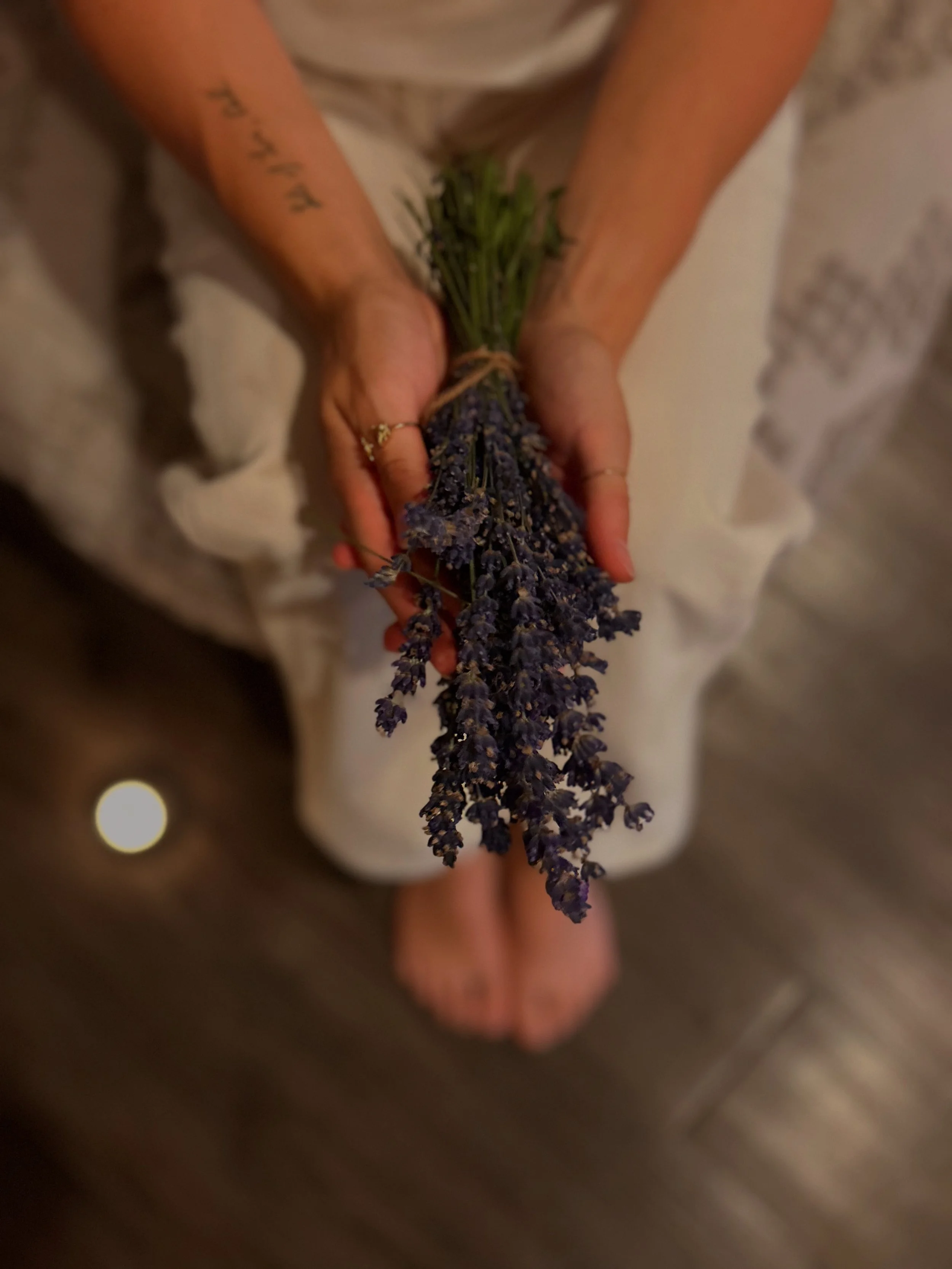ROOTED IN STILLNESS: CULTIVATING FERTILITY WITH CHINESE MEDICINE
Infertility can be a deeply emotional and complex experience. For many individuals and couples, the path to conception is filled with challenges, uncertainty, and often overwhelming options. Amid this journey, Traditional Chinese Medicine (TCM) and acupuncture offer a time-honored, holistic approach that supports the body’s natural ability to conceive—gently, safely, and in harmony with your unique constitution.
In TCM, fertility is not a fixed diagnosis—it's a dynamic reflection of your whole being. Your menstrual cycle, your digestion, your sleep, your emotions, your energy—all of these are deeply interconnected. When one area is out of harmony, the whole system gently shifts to compensate. And this means there is always a way back into alignment.We don’t separate the uterus from the heart, or the hormones from the spirit. We see you as a whole, living ecosystem. One that can be nourished, softened, and supported to do what it already knows how to do—create life.So if you're tired, be gentle. If you're grieving, be still. If you're hopeful, hold it close. There is wisdom in your body’s rhythm, even when it feels off beat.Through warmth, rest, nourishment, and care—through acupuncture, herbs, and mindful living—you can return to your natural state of balance. And from that place, life begins.
Understanding fertility through the lens of chinese medicine
In Traditional Chinese Medicine, fertility is seen not just as a matter of reproductive organs but as a reflection of overall balance and vitality in the body. At its core, TCM aims to restore the free flow of Qi and Blood, harmonize organ systems, and nourish the foundational essence (Jing) that governs reproduction.
Several organ systems play key roles in fertility from a TCM perspective:
Kidney System: Considered the root of life, the Kidneys store Jing (our vital essence) and govern reproduction and development.
Liver System: Ensures the smooth flow of Qi and Blood—crucial for regular ovulation and menstrual cycles.
Spleen System: Supports the production of Qi and Blood, and ensures a healthy uterine lining for implantation.
Heart System: Oversees emotional health and connects with the uterus via the “Bao Mai,” a channel believed to link the Heart and the womb.
When these systems are out of balance—due to stress, overwork, poor digestion, trauma, or age—fertility may be impacted.
How acupuncture supports fertility
Regulates the Menstrual Cycle: By balancing hormones and improving blood flow to the reproductive organs, acupuncture can support regular ovulation.
Improve Ovarian and Uterine Function: Increased blood flow to the ovaries and uterus can enhance the quality of follicles and endometrial lining.
Reduce Stress: High stress levels negatively affect hormonal balance and ovulation. Acupuncture has been shown to calm the nervous system and regulate cortisol levels.
Support Assisted Reproductive Technologies (ART): Acupuncture can be used alongside IUI and IVF, increasing success rates by optimizing the internal environment for implantation.
Address Underlying Patterns: Whether it's a Kidney Yang Deficiency, Liver Qi Stagnation, or Blood Deficiency, acupuncture treatment is tailored to correct these imbalances and support the body’s natural fertility.
“Supporting fertility is not always about doing more. Often it’s about listening more deeply to your body’s quiet signals and giving yourself the care and rhythm you may have never been taught to prioritize.”
Herbal medicine and dietary therapy
In addition to acupuncture, Chinese herbal medicine plays a crucial role in fertility support. Custom formulas are designed to address specific imbalances and may help to:
Improve egg quality and quantity
Regulate hormones
Treat conditions like PCOS, endometriosis, or luteal phase defect
Strengthen overall vitality and immune function
A 2023 review found that TCM herbal therapies improved pregnancy outcomes in women with unexplained infertility, with an average pregnancy rate of 50–60%, compared to 30–40% in Western medicine control groups.
Dietary therapy is another cornerstone of TCM fertility support. Food is medicine, and you may be guided to eat warming, nourishing meals that support Blood and Qi, reduce internal dampness or cold, and enhance digestion—all of which directly impact reproductive health.
You'll be encouraged to eat foods that build Blood, nourish Qi, and minimize Damp or Cold patterns. Think: bone broth, warming stews, root vegetables, and iron-rich greens.
The Emotional and Energetic Side of Fertility
Infertility isn’t just physical—it’s often emotionally charged. TCM recognizes the profound impact emotions have on the body. Anxiety, frustration, grief, and disappointment can disrupt the free flow of Qi, particularly in the Liver and Heart systems. Acupuncture treatments often include points that calm the mind, lift the spirit, and allow the body to soften into a state more conducive to conception.
A Gentle and Personalized Approach
What makes TCM and acupuncture so powerful in fertility care is their ability to see and treat the individual. No two people are the same, and neither are their fertility journeys. Whether you are just beginning to explore your options, are trying to conceive naturally, or are undergoing assisted reproductive treatments, acupuncture and TCM provide a deeply supportive, personalized path toward hormonal harmony, reproductive health, and emotional resilience.
What you can do at home
-
In TCM, the womb is seen as a “warm palace.” Cold can hinder blood flow and create stagnation in the uterus.
Keep your lower abdomen warm, especially after ovulation and during your period.
Avoid walking barefoot on cold floors.
Choose warm, cooked foods over raw or cold (think: soups, stews, congee).
Use a castor oil pack or a hot water bottle (before ovulation) to support blood flow to the uterus.
-
Begin charting your cycle as a whole system—your temperature, cervical mucus, sleep, digestion, mood, bowel movements etc.
This gives insight into patterns of Yin Yang, Blood and Qi.
Apps like Kindara or Tempdrop can support this, but even a simple journal works.
Notice emotional shifts across your cycle—TCM views these as clues to your organ systems (e.g., irritability = Liver Qi profusion).
-
Menstruation: Rest, avoid heavy exercise, nourish Blood (soups, congee, warming teas).
Follicular phase (before ovulation): Build Yin and Blood—hydration, gentle movement, calming foods.
Ovulation: Open, move, support joy and flow—Liver Qi loves creativity and expression.
Luteal phase (after ovulation): Support Yang—keep warm, avoid cold/raw foods, slow down.
-
Stress constrains the Liver Qi, which disrupts hormonal balance and ovulation.
Practice deep breathing, gentle yoga, or Qi Gong.
Journaling, art, or simply allowing yourself to feel and express your emotions is powerful in TCM.
Talk to an acupuncturist about what points you can self massage at home. Certain points are used at different phases of your mesntrual cycle, so being informed helps in supporting fertility.
Aim for 7–9 hours of quality sleep.
Create a wind-down ritual (dim lights, no screens, maybe a foot soak with Epsom salts or ginger).
Going to bed before 11 p.m. helps your Liver and Gallbladder perform their detox and renewal functions.
“In the quiet spaces between heartbeats,
life begins long before the seed is sown.
In Chinese medicine, we do not rush creation.
We listen.
To the pulse beneath our fingertips,
to the stories your womb has not yet spoken.
Fertility is not just a destination—it is a state of being.
A conversation between Yin Yang,
a softening of the Liver,
a deep-rooted breath into the Kidneys,
a steady building of Blood.
Your body is not a machine to be fixed,
but a garden to be tended.
Sometimes, the soil needs rest.
Sometimes, the sun must warm the earth
before anything dares to rise.
Acupuncture invites the river to flow again.
Herbs whisper to your cells of ancient knowing.
Food nourishes not just hunger,
but the very essence of who you are—your Jing,
your potential, your quiet power.
And you—
you are not behind.
You are not broken.
You are not late.
You are in season.
And in this season,
we turn inward,
we nourish,
we wait,
we believe.
Because life—like all things in nature—
blooms in its own time,
when the roots run deep enough
to hold it.”



